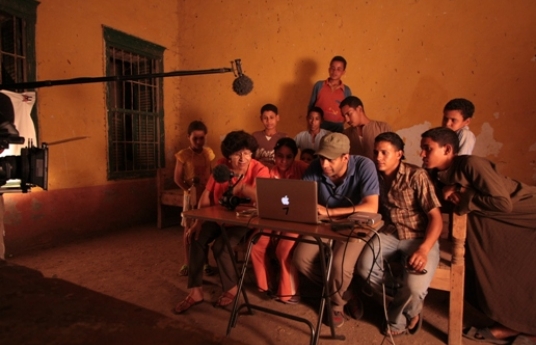Change Is The Only Constant: Arab Documentaries at DTFF
Oct 19, 2011 — Film Festival

Bold Docs Take on the Contested Past and the Turbulent Present at 2011 Festival
Doha: October 19, 2011: A line-up of smart, fascinating and fearless documentaries from across the Arab world will be shown at the Doha Tribeca Film Festival (DTFF) next week, charting unexplored territory in the region’s most turbulent year in decades.
Commenting on the breadth of the documentaries from the Arab World, DFI’s Chief Arab Programmer Hania Morue said: “Obviously the changes in the region that happened the past year will be at the top of everyone’s mind at this edition of the DTFF, and our selection of documentaries provides for reflection on political change. However, we also offer a number of documentaries that look into private worlds and subtler aspects of the Middle Eastern experience that are not always evident to political observers. Whatever their preference, there will be a documentary at DTFF that will make audience members pause and see the region in a new light.”
This year’s ‘Arab Spring’ is very much present in Elyes Baccar’s Rouge Parole, which follows the story of the Tunisian popular revolution and the expulsion of President Ben Ali. In the same spirit, Flood in the Baath Country, by late Syrian director Omar Amiralay, will show as a special tribute screening. Amiralay, who passed away in February 2011, was instrumental in the ‘Damascus Spring’ of 2000, and his controversial 2004 film delves into the aftermath of the Tabqa Dam project to ask what has become of the dream of Arab socialism.
Approaching change from a gender perspective, Lina Alabed’s Yearning asks women in Damascus to describe the awakening of their consciousness and awareness of the limitations of their lives in a male-dominated society.
Women are also under the lens in two pulse-pounding sports documentaries that explore the taboos surrounding women and boxing in Tunisia (Boxing with Her by Latifa Robbana Dohri and Salem Trabelsi) and the life-changing and redemptive experiences of a young women’s basketball team in Northern Iraq (Salaam Dunk by David Fine).
The creative documentary Crayons of Askalan by Laila Hotait Salas, recreates the powerful story of Palestinian artist Zuhdi al Adawi, who was imprisoned in 1975 at the age of 15. Even in the notorious Askalan jail in Israel, al Adawi kept his spirit alive through his artwork with the help of his family and community.
Rania Stephan’s The Three Disappearances of Soad Hosni is another experimental documentary that exclusively uses footage from Hosni’s films to tell the story of the tragic life of the Egyptian film icon, who embodied the image of the modern Arab woman until her tragic death in 2001.
Two other Egyptian documentaries attest to Cairo’s rich human tapestry: On the Road to Downtown by Sherif El Bendary follows the lives and aspirations of six people connected in different ways to Cairo’s diverse downtown core. Namir Abdel Messeeh’s The Virgin, The Copts and Me takes a more otherworldly subject in investigating the appearance of the Virgin Mary to millions of people in Egypt via a videotape on which only the true believers can see her image.
Show times for all Arab documentaries can be found at www.dohafilminstitute.com/filmfestival
About Doha Film Institute (DFI):
The Doha Film Institute (DFI) is an independent cultural organisation established in 2010 to incorporate Qatar’s film initiatives under one banner.
Located at Qatar’s new cultural hub, Katara, DFI’s many initiatives include film and television funding for MENA and international films, year-round education programs, film screenings, and the annual Doha Tribeca Film Festival (DTFF).
In addition, DFI has established a number of strategic cultural partnerships with leading local and international organisations including Katara Cultural Village Foundation, Tribeca Enterprises, World Cinema Foundation, Maisha Film Labs and Giffoni Film Festival.
DFI was founded by H.E Sheikha Al Mayassa bint Hamad bin Khalifa Al-Thani. Along with Her Excellency, DFI leadership comprises DFI Board Vice-Chair and Festival Board Chair, H.E. Sheikh Mohammed Bin Fahad Al-Thani; DFI Board Member and Festival Board Vice-Chair, H.E. Dr. Hassan Al-Nimah; DFI Board Member, Mr. Mansoor Ibrahim Al-Mahmoud; Festival Board Member, H.E. Sheikh Jabor Bin Yousuf Al Thani; and DFI Executive Director, Amanda Palmer.